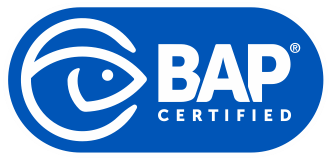
Best Aquaculture Practices (BAP) is a seafood specific certification program that addresses the four areas – environmental, animal health and welfare, food safety, social – at each step of the aquaculture production chain. Responsible and healthy approaches to feeding the world’s population are more critical now than ever before. As wild fisheries have reached their harvest capacities, aquaculture, also known as fish farming, is needed so future generations can continue to enjoy seafood.
TRACEABILITY
BAP has a chain-of-custody traceability process that’s an integral part of the program as well.
The BAP program uses a star system to represent each part of the farmed seafood supply chain, which includes the processing plant, farm, hatchery, and feed mill.
Links are important because the information provided by facilities is used to highlight the facility’s multi-star chain so customers can understand where the product originated from. A plant that is four-star capable should have valid links to at least one certified farm, hatchery, and feed mill. Links are used to show how a product flows through this chain, from one BAP-certified facility to another. Learn more at www.bapcertification.org
Ducktrap certified products certified products are processed in the Belfast, Maine facility using raw material from Chile and Colombia.
Cert # P10774